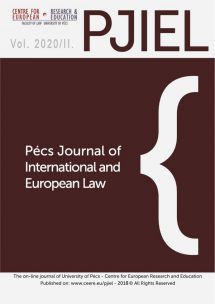Vol. 2020/II.
Editorial
The editors are pleased to present issue 2020/II of the Pécs Journal of International and European Law, published by the Centre for European Research and Education of the Faculty of Law of the University of Pécs.
The editorial comments of the current issue address some aspects of the conflict in Nagorno-Karabakh. In this issue’s first article, Nives Mazur-Kumrić and Ivan Zeko-Pivač discuss the EU’s role as a global trendsetter in the fight against climate change, paying special attention to the funding scheme dubbed the Just Transition Mechanism. Sandra Fabijanić Gagro looks at the Responsibility to Protect through the lens of the protection of children. Petra Ágnes Kanyuk provides an appraisal of the effects of EU substantive criminal law harmonisation measures on Hungarian criminal law. Tomáš Strémy and Lilla Ozoráková ponder the possible impact of the introduction of the new offence of abuse of law on the independence of the judiciary in Slovakia. Upal Aditya Oikya considers whether atrocities against religious minorities of Bangladesh can be considered genocide. Finally, Ágoston Mohay provides a brief problem-raising overview of the responsibility of international organisations and their member states.
As always, a word of sincere gratitude is due to the anonymous peer reviewers of the current issue.
We encourage the reader, also on behalf of the editorial board, to consider the PJIEL as a venue for publications. With your contributions, PJIEL aims to remain a trustworthy and up-to-date journal of international and European law issues. The next formal deadline for submission of articles is 15 March 2021, though submissions are welcomed at any time.

